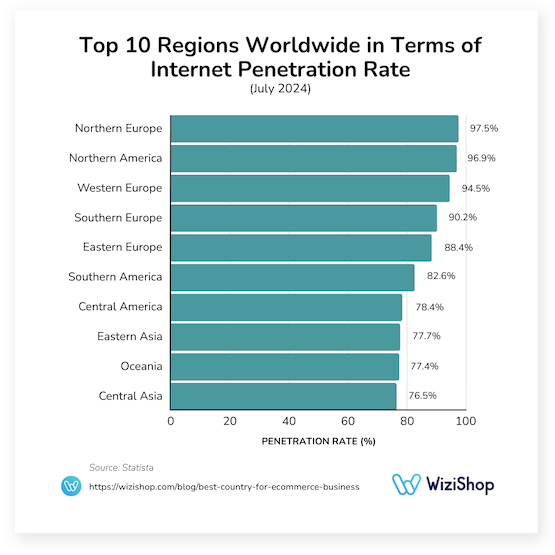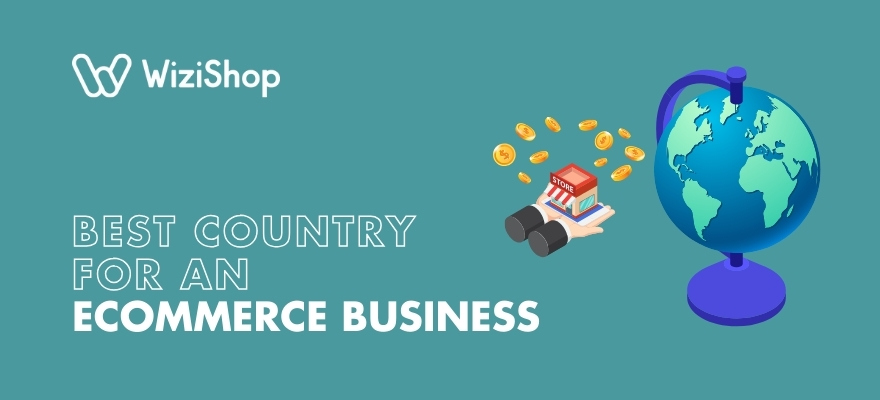One of the significant advantages of ecommerce is that it allows companies to go global, selling to consumers all around the world and therefore expanding their customer base.
This is a major advantage for shoppers too, of course! Ecommerce and increased globalization give people more choices in terms of brands and purchases, providing a plethora of options from which to choose.
With global retail sales amounting to approximately $5.8 trillion in 2023 and expected to climb to over $8 trillion by 2027, according to Statista figures, it's a great time to start a new ecommerce business or expand your existing online store.
That being said, ecommerce statistics show that this form of commmerce is booming in some locations more than others, and knowing which places are likely to be more fruitful for your company before you enter the market can help boost your chances of succeeding with your venture.
In this article, we explain what you will want to think about before picking a country to launch your online store, tell you about today's best countries to start an ecommerce business, describe some of the challenges for a company selling online internationally, and provide you with our tips for handling these issues.
What's in the list of factors to consider when choosing a country to register your future online business?
Here are a few factors to investigate when picking the location for your new adventure in web commerce.
Web commerce market size and growth potential
When diving into the world of ecommerce, think of a large and growing online consumer base like a bustling market square—there's energy, potential, and lots of customers ready to shop!
Establishing your business in a country with an expanding pool of digital shoppers offers you a golden ticket to more sales opportunities, wider brand exposure, and, of course, the exciting possibility of scaling up fast.
Internet penetration and technology infrastructure
You will also want to think about how many people are using the web and how well the internet is set up in any potential countries you're thinking of targeting for your web commerce company.
Based on a July 2024 study by Statista, for example, the regions of Europe and the Americas have the highest internet penetration rates around the world, with Northern Europe taking the #1 spot at 97.5%.

In countries where a large chunk of the population is connected to the web, your online store will enjoy a vast audience ready to click, browse, and buy. This digital superhighway makes it easier to market products and services, share company news and engage with customers, and process transactions swiftly, setting the stage for your venture to skyrocket!
Logistics and shipping infrastructure
Imagine efficient logistics as the speedy delivery service of the ecommerce world—crucial for keeping your customers happy and costs down.
When picking a country to launch your ecommerce empire, ensuring quick and cost-effective delivery options is like guaranteeing a fast pass for customer satisfaction. This not only boosts repeat business but also helps you outpace the competition.
Government policies and regulations
Whether it’s data protection laws that guard your customers' privacy or consumer rights that ensure fair play, governmental rules shape the playing field. Picking a country for your ecommerce venture means understanding and navigating these regulations to ensure that your online store thrives without legal hiccups.
As you look into various location options for your shop, be sure to examine the different laws that might apply to the specific products you plan on selling too, as some product categories tend to be more closely regulated, such as food, alcoholic beverages, CBD goods, certain health and beauty products, and others.
Taxation and business costs
While it's admittedly not the most exciting part of managing an ecommerce business, thinking about taxes and other operational expenses is an essential task.
When choosing a country to launch your online shop, getting a grip on these financial factors is key. They can either boost your rocket to stellar success or weigh it down.
Evaluating these costs ensures you keep more of your hard-earned cash and maintain a healthy bottom line. After all, it’s not just about making money—it’s about keeping it too!
11 Best countries to start an ecommerce business and boost your revenue
Ecommerce has grown in popularity in the last few years on a global level, but which locations offer the most potential for online sellers?
1. China
China is a powerhouse in the global ecommerce landscape, generating about $1.23 trillion in 2023, according to Statista, making it the #1 country when it comes to ecommerce revenue worldwide. The country also comes in first place in terms of percentage of retail sales occurring online, with almost 50% of its total retail sales involving ecommerce.
Home to some of the world's largest online retailers, including Alibaba—which rivals Amazon in revenue—China benefits from a vast consumer base thanks to its large population and elevated internet penetration. Key subsidiaries under Alibaba, such as AliExpress, Taobao, and Tmall, bolster its market presence.
Furthermore, government support for the digital economy and the prevalence of mobile payment systems like Alipay and WeChat Pay enhance accessibility to shopping online, further cementing China's dominant role.
2. United States
The United States stands as another leading force in ecommerce around the world, raking in approximately $1.07 trillion from online sales in 2023, due to its robust economy, high consumer purchasing power, and extensive internet coverage.
The country is also recognized for its favorable business climate, attributed largely to its lower income and corporate tax rates. This provides a significant financial incentive for entrepreneurs aiming to launch an ecommerce business. Major players like Amazon, eBay, and Walmart dominate the ecommerce in the USA, particularly in household and personal care products.
With trends pointing towards nearly universal online shopping engagement among adults, Statista projections indicate that from 2024 to 2029, the number of digital buyers in the United States will increase by nearly 22%, fueled by the allure of quick, often free shipping, ensuring continuous expansion in online sales.
3. Japan
Japan's advanced technological infrastructure and a cultural penchant for convenience place it among the top countries buying online, particularly excelling in mobile commerce.
The country enjoys widespread internet and smartphone access, making online shopping platforms easily accessible. Based on a Statista study, the two product categories most popular with Japanese consumers in 2023 were "clothing," followed by "books, music, movies, and games."
Major ecommerce sites like Rakuten and Yahoo! Japan offer a wide range of products and services. Coupled with efficient logistics that ensure quick deliveries, Japan’s ecommerce sector drew in a little over $151 billion in 2023.
4. South Korea
South Korea generated impressive online shopping revenue of approximately $76.5 billion in 2023, significantly driven by the country's world-leading internet speeds. This enhances a digitally focused lifestyle where consumers prefer the convenience and speed of online transactions, making South Korea a promising location for existing and future e-tailers alike.
In addition, South Korea's compact geography boosts delivery efficiency, promoting a robust reliance on web commerce. Soaring smartphone penetration and innovative payment solutions further support a thriving mobile commerce scene.
Popular platforms like Coupang and Gmarket, known for their tailored services and user-friendly interfaces, spearhead the rise and engagement in the ecommerce sector.
5. Germany
Germany is a pivotal force in Europe's ecommerce landscape, underpinned by a robust logistical network that facilitates efficient deliveries both domestically and across borders.
With around 80% of Germans shopping online, Germany's strategic location enhances its role as a key distribution hub in Europe, contributing to the country's near $90 billion in ecommerce revenue in 2023.
Major online marketplaces like Amazon’s German site and eBay play significant roles in this sector. In terms of the most popular products purchased online by German shoppers in 2023, Statista states that "clothing" and "shoes" take the lead, with 50% and 39% of survey respondents selecting these answers respectively.
6. Hong Kong
Technically a special administrative region of China rather than a country, Hong Kong is another one of the best places to start an online store due to its strategic geographical position at the gateway to China and the broader Asia-Pacific region, facilitating easy access to vast markets.
The region boasts a highly developed infrastructure, powerful telecommunications, and one of the world's most efficient ports, which streamline logistics and distribution. It's also worth noting that the number of online shoppers in Hong Kong is expected to grow over 39% from 2024 to 2029, according to Statista.
What's more, Hong Kong's simple tax regime with low tax rates and minimal bureaucracy provides a favorable environment for businesses. Its strong legal framework and protection of intellectual property further enhance its attractiveness as a hub for online sellers.
7. France
France is an appealing destination for launching an ecommerce business, thanks to its large and affluent consumer market. The country boasts high internet penetration (almost 94% as of July 2024) and widespread adoption of digital technology, creating a fertile environment for online sales.
France's strategic location in Europe offers easy access to other major European markets, enhancing cross-border trade opportunities. In addition, the French government supports digital economy prosperity through various initiatives and incentives, which help facilitate ecommerce operations.
This combination of a booming digital infrastructure, a supportive regulatory environment, and a strong consumer base helped France produce about $60.6 billion in ecommerce revenue in 2023 and makes the country a prime choice for web commerce businesses.
8. United Kingdom
The United Kingdom is an ideal locale for launching an ecommerce business with its mature digital market, high consumer spending power, and widespread internet connectivity. The country boasts a tech-savvy population that's comfortable with online shopping, supported by advanced digital payment systems and comprehensive consumer protection laws.
The United Kingdom also offers a competitive ecommerce environment with both global giants, e.g., Amazon UK, and local players, e.g., Argos and Tesco, stimulating constant innovation and improving service standards.
Another major plus to starting an online store in the United Kingdom? Its strategic location allows for easy access to both European and global markets, further enhancing its appeal as a hub for ecommerce companies and allowing the country to bring in approximately $118.3 billion in online sales revenue in 2023.
9. Singapore
Singapore is highly regarded as a prime location for starting an ecommerce business, largely due to its straightforward and efficient business setup processes, economic and political stability, and strategic geographic position in Asia. In fact, Statista reports that the country's ecommerce revenue is predicted to jump over 67% between 2024 and 2029.
Setting up a company in Singapore can be completed online in just a few days, and the country offers various investment schemes to support entrepreneurs. What's more, Singapore’s stable political climate and low corruption make it a safe investment destination.
However, potential entrepreneurs should be aware of some challenges such as the competitive labor market and high operational costs. Despite these potential drawbacks, the extensive network of double taxation agreements and the absence of capital gains tax provide significant financial advantages.
10. Canada
Canada is another great place to launch an online store because of its extensive internet coverage and culturally diverse population that embraces online shopping. In 2023, Canada generated approximately $58.7 billion in ecommerce revenue, benefitting from its vast geography, which makes online shopping a convenient option for both remote and urban dwellers.
The country's English/French bilingual policy bolsters market reach and customer service, creating personalized shopping experiences. Strong consumer protections and robust logistics further boost consumer confidence and market growth.
Among the ecommerce leaders in Canada, Amazon Canada dominates, especially in computers and electronics, while other North American brands like Walmart and Home Depot also perform well in the Canadian market.
11. India
Last but not least, India has also become a leading force in global ecommerce, being one of the top 10 countries in terms of ecommerce revenue in 2023, amassing almost $51 billion.
In addition, India experienced the sixth greatest amount of ecommerce sales growth worldwide in 2023, with an increase of about 15% compared to the previous year. This rapid growth in a relatively short time is driven by a youthful, tech-savvy population rapidly embracing digital technology. Increased smartphone usage and internet access, particularly in rural and semi-urban areas, have expanded the consumer market significantly.
Local giants like Flipkart and Snapdeal, alongside global entities like Amazon, have successfully adapted their offerings to meet the specific tastes and economic considerations of Indian shoppers. Government efforts to boost digital payments have also played a crucial role in enhancing the convenience and popularity of online shopping in India.
Challenges of running an international ecommerce business + tips
Going global with your online store means opening your business up to new markets and paving the way for a whole new wave of potential customers! That being said, an international strategy isn't without its hurdles...
Cultural differences
Navigating cultural differences can be a significant challenge for international ecommerce businesses, as cultures can vary greatly even in two countries that speak the same language!
To effectively manage this, it's best to first thoroughly research cultural norms and buying habits in each target market to tailor your marketing and customer service approaches accordingly. Localizing content, including language and payment preferences, is crucial.
Partnering with local experts can provide invaluable insights and help bridge any cultural gaps, ensuring that your business resonates well with diverse customer bases.
Payment integration
Integrating diverse payment options in international ecommerce can be challenging due to varying local preferences and regulatory environments. It's therefore advantageous to research and implement popular local payment methods for each market, such as credit cards, mobile payments, or bank transfers.
Furthermore, offering multiple currency options can also enhance customer convenience. Utilizing global payment platforms that comply with local regulations can simplify the process, while ensuring data security to build trust among international customers.
Currency fluctuations
Currency fluctuations also pose a significant risk for international ecommerce businesses, impacting pricing and profit margins. For this reason, you might consider using a currency risk management strategy such as setting up forward contracts to lock in exchange rates for future transactions.
Providing pricing in local currencies can additionally improve customer trust and conversion rates. Regularly reviewing and adjusting your pricing strategies can also help accommodate ongoing changes in exchange rates and maintain profitability.
Which country is going to be the best and easiest for you to start an ecommerce business and sell online?
While exploring the best places to register and start an ecommerce business, it's clear that there is no one-size-fits-all answer. The ideal location depends on a variety of factors including market size, consumer behavior, logistical infrastructure, and legal considerations.
Each online seller must weigh these elements based on their specific business needs and goals. Ultimately, the best country for one web commerce venture might not be the same for another. Tailoring your choice to align with your business strategy is key to success.
And to help make the process of launching and managing your ecommerce business even easier, you will want to be sure to have a top-tier ecommerce platform like WiziShop on your side!
WiziShop offers a plethora of worldwide payment and delivery providers from which to choose, allowing you to pick the solutions that best suit you and your target audience. What's more, when opting for our Multilingual feature, you can add up to seven different languages to internationalize your online store and begin selling to shoppers all over the globe in no time.
Register today and enjoy a 7-day free trial!
Try WiziShop free for 7 days
THE EASIEST NO-CODE ECOMMERCE SOLUTION✅ No credit card required
✅ Access to all features
✅ No commitment










